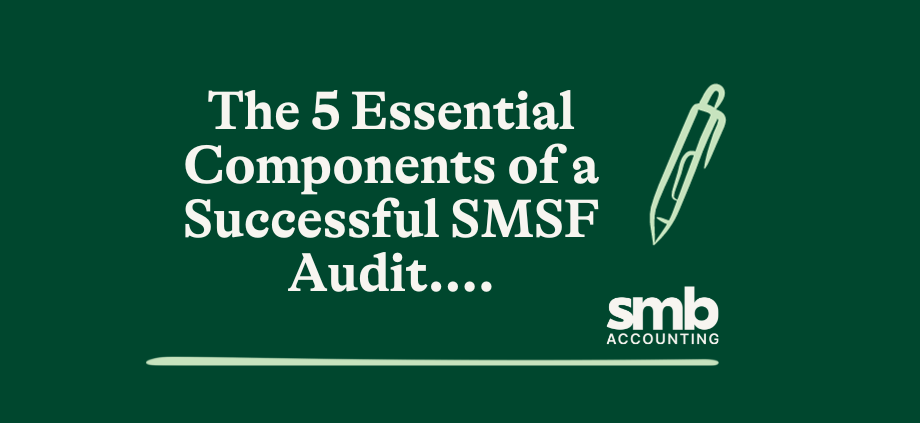The 5 Essential Components of a Successful SMSF Audit: Best Practices and Pitfalls to Avoid
Self-managed super funds (SMSFs) have become increasingly popular in Australia, providing investors with greater control and flexibility over their retirement savings. However, managing an SMSF also comes with increased responsibility, especially when it comes to compliance and auditing. A thorough SMSF audit is a crucial aspect of ensuring the financial and regulatory health of your fund.
In this blog post, we will discuss the five essential components of a successful SMSF audit. By understanding these components and following best practices, you can avoid common pitfalls and confidently manage your SMSF. We will cover topics such as the importance of accurate financial records, regulatory compliance, investment strategies, and more.
With our guidance, you’ll gain practical insight into how you can optimise your SMSF audit process and maintain the financial integrity of your super fund. So, let’s dive into the critical aspects of a successful SMSF audit and set your fund up for long-term success.
1. Accurate Financial Records and Supporting Documentation
One of the critical components of a successful SMSF audit is having accurate and up-to-date financial records for your fund. These records form the foundation of your auditor’s assessment of your SMSF’s financial health and compliance with regulatory requirements. It is crucial that you maintain:
– Bank statements reflecting all SMSF transactions
– Invoices and receipts for purchases and sales of investments
– Proof of income, such as dividends and rental income
– Documents related to expenses, including insurance premiums and management fees
By ensuring your financial records are complete, accurate, and easy to access, you’ll facilitate a smooth and efficient audit process. For guidance on what records to keep, consult the ATO’s record-keeping requirements for SMSFs.
2. Regulatory Compliance
Another critical aspect of a successful SMSF audit is demonstrating compliance with all relevant regulations and legislation. An SMSF audit involves two parts: the financial audit and the compliance audit. The financial audit assesses the accuracy of your financial statements, while the compliance audit evaluates the adherence to superannuation laws. Some essential compliance aspects to consider include the following:
– Contribution caps: Ensure that the contributions made to your SMSF fall within the allowable caps to avoid excess tax.
– Limited recourse borrowing arrangements (LRBAs): If your SMSF has entered into an LRBA, ensure it complies with the relevant regulations and guidelines outlined by the ATO, including not mixing borrowed funds with other SMSF assets.
– Sole purpose test: To meet the requirements for concessional tax treatment, your SMSF must be maintained for the sole purpose of providing retirement benefits. A breach of this test can lead to severe penalties.
Familiarise yourself with the ATO’s regulations and guidelines for SMSFs to ensure you remain compliant and facilitate a positive audit outcome.
3. Clear and Defined Investment Strategy
A well-defined investment strategy is essential for SMSF success and ensures that your fund’s investments align with your retirement goals. During the audit process, the auditor will assess your investment strategy’s effectiveness and consider whether your SMSF adheres to it. Some essential elements of an investment strategy include:
– Diversification: Ensure your SMSF investments are spread across a range of asset types to minimise risk.
– Risk profile: Consider the level of risk you’re willing to accept in your investments, keeping in mind your risk tolerance and time horizon until retirement.
– Liquidity requirements: Factor in liquidity to cover potential expenses, such as insurance premiums or pension payments, when required.
– Insurance considerations: Assess the need for life and income protection insurance for your SMSF members as part of your investment strategy.
Regularly review and update your SMSF investment strategy to reflect changing circumstances and market conditions.
4. Timely Annual Reporting and Lodgment
Meeting annual reporting and lodgment deadlines is crucial for a successful SMSF audit. By submitting your SMSF’s annual return on time, you’ll avoid penalties and ensure your fund remains compliant. Key deadlines to remember include:
– Annual return lodgment: Typically, SMSFs must lodge their annual return with the ATO by 28 October or 15 May, depending on whether the fund is newly registered or has lodged before.
– Actuarial Certificate: If your SMSF is paying a retirement pension and uses the proportionate method to claim exempt current pension income (ECPI), you must obtain an actuarial certificate before lodging the annual return.
Stay informed of any changes to reporting and lodgment deadlines by checking the ATO’s lodgment program for tax agents.
5. Engaging a Qualified SMSF Auditor
The final component of a successful SMSF audit is engaging the services of a qualified auditor. The auditor should be registered with the Australian Securities and Investments Commission (ASIC) and have an [SMSF Auditor Number (SAN). A professional auditor will ensure your SMSF meets all regulatory compliance requirements and provide valuable feedback regarding your SMSF’s financial health.
By selecting an experienced auditor, you benefit from their expertise and guidance, helping you navigate the complexities of SMSF management and ensuring a positive audit outcome.
Securing Your SMSF’s Future Success
Mastering the five essential components of a successful SMSF audit will not only ensure regulatory compliance but also contribute to your fund’s long-term financial growth and stability. By paying close attention to accurate record-keeping, regulatory compliance, investment strategy, annual reporting, and engaging a qualified auditor, you make a solid investment in your SMSF’s future.
At SMB Accounting, we understand how important your SMSF’s success is to you. Our team of experienced SMSF professionals is here to provide you with expert support and guidance throughout the auditing process. Don’t leave your SMSF’s future to chance – contact our SMSF auditors today and allow our experts to help you navigate the complexities of SMSF auditing and management. Together, we’ll ensure your fund remains compliant, optimised, and on track for an enjoyable, financially secure retirement!

